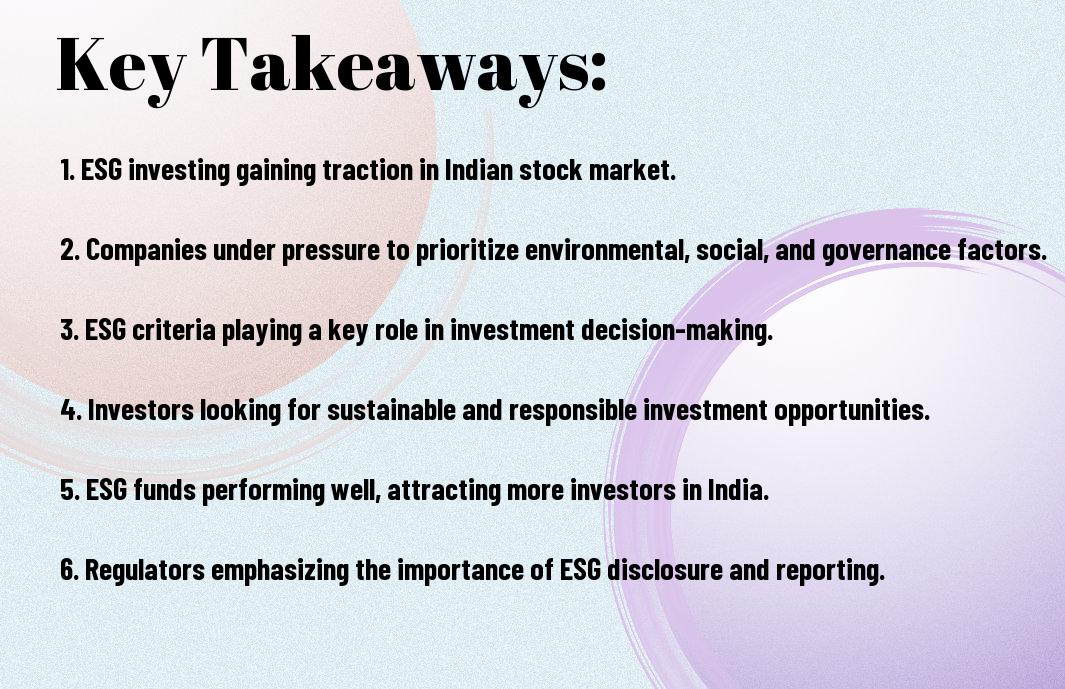As an investor, it is crucial for you to understand the evolving landscape of ESG (Environmental, Social, and Governance) investing in the Indian stock market. With growing concern for sustainable and responsible investment practices, ESG has gained significant momentum in recent years. In fact, research shows that companies with strong ESG performance are more likely to deliver long-term value to their shareholders. However, with the increasing number of ESG funds and strategies in the market, it is important to navigate the complexities of ESG investing effectively. This blog post will provide you with key insights into the future of ESG investing in the Indian stock market, and how you can capitalize on this growing trend while mitigating potential risks.
Key Takeaways:
- Growing Interest: ESG investing is gaining traction in the Indian stock market as more investors are becoming socially conscious and looking for sustainable investment options.
- Regulatory Support: The Indian government has been introducing ESG-related regulations and initiatives to promote responsible investing, which is likely to further drive the growth of ESG investing in the country.
- Integration of ESG Factors: Companies in the Indian stock market are increasingly incorporating ESG factors into their business strategies, which is creating opportunities for ESG investors to make ethical and profitable investments.

Evolution of ESG Investing in India
Obviously, the concept of Environmental, Social, and Governance (ESG) investing has been gaining significant traction in the Indian stock market. As the awareness of sustainable and responsible investing practices grows, more and more investors are looking beyond just financial returns and considering the broader impact of their investments. This shift is reshaping the investment landscape in India and has the potential to drive positive change in corporate behavior.
Historical Perspective
In the past, ESG investing in India was largely overlooked, with traditional financial metrics taking precedence. However, as the environmental and social challenges facing the country became more apparent, investors started recognizing the importance of incorporating ESG factors into their investment decisions. The historical perspective shows that there has been a gradual but steady shift towards ESG considerations, reflecting the growing awareness of the long-term implications of sustainability and responsible corporate practices. This shift signifies a significant turning point in how investment decisions are made, with a growing emphasis on non-financial performance metrics.
Recent Trends and Developments
Recent years have witnessed a noticeable uptick in ESG investing in India, with more institutional investors and asset managers integrating ESG factors into their investment strategies. The regulatory environment has also played a crucial role in promoting ESG considerations, with the Securities and Exchange Board of India (SEBI) introducing mandatory ESG disclosures for listed companies. This development has brought ESG considerations to the forefront, signaling a new era of transparency and accountability in the Indian stock market. As a result, companies are now under increasing pressure to improve their ESG performance, aligning their practices with sustainable development goals and ethical business conduct.
Drivers of ESG Investing in India
After years of being a peripheral consideration for investors, ESG (Environmental, Social, and Governance) investing is gaining traction in the Indian stock market. Various factors are driving this trend, creating a conducive environment for the growth of ESG investing in India. Understanding these drivers is crucial for recognizing the potential and impact of ESG investing in the Indian context.
Regulatory Influences
Regulatory influences play a significant role in driving ESG investing in India. The Securities and Exchange Board of India (SEBI) has introduced mandatory disclosure requirements related to ESG parameters for listed companies. This has increased transparency and accountability, making it easier for investors to assess the sustainability performance of companies. Additionally, the introduction of initiatives such as the National Voluntary Guidelines on Social, Environmental and Economic Responsibilities of Business by the Ministry of Corporate Affairs has reinforced the importance of ESG considerations in business practices. These regulatory measures have created a more favorable environment for ESG investing, reflecting a growing commitment to sustainable and responsible investment practices in the Indian stock market.
Investor Demand and Market Forces
Your increasing awareness and demand for sustainable and ethical investment options have also been a driving force behind the growth of ESG investing in India. As investors become more conscious of the long-term implications of their investment decisions, they are seeking opportunities that align with their values and principles. This shift in investor behavior has put pressure on corporations to integrate ESG considerations into their business strategies. Moreover, the rising influence of millennial investors, who prioritize sustainability and social impact, has further propelled the demand for ESG-focused investments. As a result, market forces are reshaping the investment landscape in India, with ESG criteria gaining prominence as a critical factor in investment decision-making.
Challenges and Opportunities
Lastly, let’s discuss the challenges and opportunities that come with ESG investing in the Indian stock market. As with any investment strategy, there are both hurdles to overcome and promising prospects to explore.
Data Transparency and Availability
When it comes to ESG investing, one of the primary challenges in the Indian stock market is the lack of consistent and reliable ESG data. Many companies in India do not report on their ESG practices, making it difficult for investors to accurately assess their performance in these areas. However, this presents a significant opportunity for investors to put pressure on companies to improve their ESG reporting and transparency, ultimately driving positive change in the market.
Integration of ESG in Investment Strategies
Another challenge lies in the integration of ESG factors into traditional investment strategies. As an investor, you may find it challenging to incorporate ESG considerations into your decision-making process, especially if you have been following more traditional approaches. However, this also presents an opportunity to diversify and strengthen your investment portfolio by incorporating ESG-focused funds and companies that align with your values and long-term goals.
ESG Investment Strategies in India
Your approach to ESG investment in the Indian stock market will largely depend on your goals, risk tolerance, and investment horizon. According to a recent report by Outlook India, investors are still warming up to ESG-focussed funds in India, despite the drop in asset base by Rs 2020 crores in FY23. This indicates that ESG investing is gaining traction in the Indian market, and there are various strategies available to consider.
ESG Rating and Analysis
ESG rating and analysis is an essential aspect of ESG investment strategies in India. It involves evaluating the environmental, social, and governance practices of companies to determine their sustainability and ethical impact. Factors such as carbon footprint, employee welfare, board diversity, and ethical sourcing are scrutinized to make informed investment decisions. By incorporating ESG rating and analysis into your investment approach, you can align your portfolio with companies that demonstrate strong ESG principles, potentially reducing risk and enhancing long-term performance.
Case Studies of Successful ESG Investments
Case studies of successful ESG investments in the Indian stock market illustrate the potential for generating positive returns while making a positive impact. Companies such as Tata Steel, Infosys, and HDFC Bank have showcased sustainable practices and strong ESG performance, resulting in a favorable market outlook and investor confidence. Studies have shown that these companies have outperformed their counterparts in terms of financial returns and sustainability metrics. By examining these successful case studies, you can gain valuable insights into the tangible benefits of integrating ESG considerations into your investment strategy.
- Tata Steel: Increased renewable energy use by 23% in the past year, contributing to a significant reduction in greenhouse gas emissions
- Infosys: Implemented a comprehensive water management strategy, reducing water consumption by 45% and receiving accolades for sustainability initiatives
- HDFC Bank: Actively involved in community development projects and achieved a 25% increase in gender diversity within its workforce

The Road Ahead
Now that ESG investing has gained significant traction in the Indian stock market, the road ahead is full of potential but also challenges. As an investor, it is crucial for you to stay informed and adapt to the changing landscape of ESG investing to make the most out of your investment opportunities.
Predictions for the Future
Looking ahead, the future of ESG investing in the Indian stock market seems promising. With increasingly stringent regulations and growing consumer awareness, the demand for sustainable and ethical investment options is expected to soar. As an investor, you can anticipate a shift towards companies with strong ESG practices, which will drive their stock performance. However, it is important to remain vigilant as the ESG landscape continues to evolve, and to carefully analyze the ESG criteria of companies to avoid any potential risks. Keeping an eye on emerging ESG trends, such as social impact investing and sustainable bonds, will be crucial in shaping your investment strategies.
The Role of Innovation and Technology
As technology continues to revolutionize every industry, including finance and investing, it will play a pivotal role in the future of ESG investing in the Indian stock market. You can expect to see innovative ESG data analysis tools and platforms, enabling you to make more informed investment decisions. Furthermore, technological advancements will facilitate greater transparency and accountability in ESG reporting, allowing you to assess companies’ ESG performance more accurately. Embracing these technological advancements and leveraging them to integrate ESG factors into your investment approach will be essential for staying ahead in the evolving ESG landscape.
The Future of ESG Investing in the Indian Stock Market
Taking this into account, the future of ESG investing in the Indian stock market looks promising. As the awareness of environmental, social, and governance factors continues to grow, investors are increasingly considering ESG criteria when making investment decisions. Companies in India are also recognizing the importance of ESG practices and are making efforts to improve their performance in these areas. With the implementation of regulations and the emphasis on sustainable and responsible investing, you can expect to see a significant increase in ESG investing within the Indian stock market in the coming years. As more investors prioritize ESG considerations in their portfolios, it is likely to drive positive change in the corporate behavior and performance in India, leading to a more sustainable and ethical investment landscape.
FAQ
Q: What is ESG Investing in the Indian Stock Market?
A: ESG Investing refers to the incorporation of Environmental, Social, and Governance criteria into investment decisions. In the Indian stock market, this approach focuses on companies that prioritize sustainability and ethical business practices while also delivering financial returns.
Q: How is ESG Investing making an impact in the Indian Stock Market?
A: ESG Investing is gaining traction in the Indian Stock Market as more investors are recognizing the importance of sustainable and responsible investment practices. This has led to the growth of ESG-focused funds and an increased emphasis on corporate sustainability and transparency in the Indian business landscape.
Q: What are the challenges and opportunities for ESG Investing in the Indian Stock Market?
A: One of the challenges for ESG Investing in the Indian Stock Market is the lack of standardized ESG disclosure and reporting by companies. However, this also presents an opportunity for the market to develop clearer ESG metrics and incentivize companies to improve their ESG performance. Additionally, the growing awareness and demand for ESG investments in India present an opportunity for the market to incorporate sustainable practices into mainstream investment strategies.

